Brazil is probably the only major soccer-playing country where reporters can join in goal celebrations and interview players as they fight on the pitch.
Dozens of television and radio reporters stand on the touchlines at games in Brazil, interviewing players seconds before kick-off, at halftime and when they storm off the pitch after being shown a red card.
If a fight breaks out, they run onto the pitch and try and get a few quick quotes. When a player scores, he will often go straight to the cameras and microphones so his celebration can be broadcast to millions of listeners.
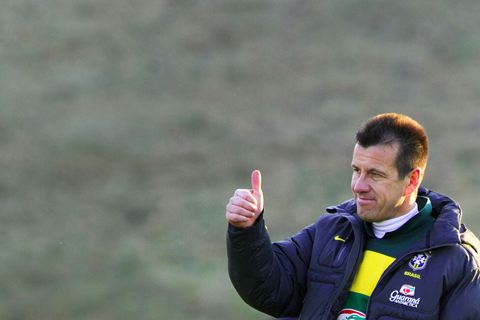
PHOTO: AFP
Last year, Ronaldo, playing his first domestic game in Brazil for 15 years, left the field with a black eye after he was hit on the head by a microphone and a television camera in a media scrum on the field at the end of the match.
After so long in Europe, he was shocked at finding reporters on the field.
“I can’t answer questions when I’m warming up,” he said.
For the hundreds of Brazilian reporters who are sent to the World Cup, the set-up, with no pitch access, can be a shock.
They have, however, traditionally enjoyed access to players that colleagues from other countries can only dream of.
Even at the height of a World Cup, Brazil would organize a daily “mixed zone” in which the players would walk alongside a barrier on their way back to the team bus, answering questions from the several hundred people in the media pack on the other side of the fence.
Although something of a sweaty scrum, it generally worked well. This World Cup, however, has been completely different.
Coach Dunga has replaced the sacred mixed zone with a daily conference in which two selected players trot out the usual cliches to a room of 400 reporters.
He has even done the unthinkable and restricted access to training sessions — often broadcast live in Brazil.
The new policy has been especially tough on radio reporters, who have hours of air time to fill. Radio is still hugely important in Brazil, where many people still do not have Internet access.
“We have to talk on seven programs every day and the hourly news bulletins,” Radio Itatiaia reporter Wellington Campos said. “In the past, it was always very open, not just for the Brazilians but also for foreigners, you could choose the player you wanted to speak to. That’s over.”
This has led to tensions between the media and the team, especially as Dunga has included the powerful Globo television network — Brazil’s rights holders — in his clampdown.
Four years ago, players would take part in round tables and give exclusive interviews to Globo but, under Dunga, they are treated the same as everyone else.
Tensions boiled over after Sunday’s win over Ivory Coast, with an exchange between Dunga and a Globo journalist during the post-match press conference.
Brazilian media said Dunga was heard to swear under his breath.
Globo later criticized the coach’s behavior and has since refused to use his name.
With the battle set to continue, Brazil’s 2002 World Cup winning coach Luiz Felipe Scolari suggested a truce.
“We have to put up with each other,” he said. “The best thing is to work together, and when the World Cup finishes, each side can tell the other to go to hell.”
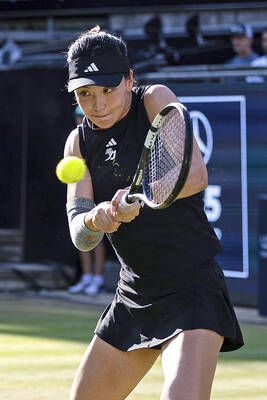
Twelve days after winning her second Grand Slam title at the French Open, Coco Gauff fell at the first hurdle on grass in Berlin on Thursday as beaten Paris finalist Aryna Sabalenka advanced to the quarter-finals. Recipient of a first round bye, American Gauff lost 6-3, 6-3 to Chinese qualifier Wang Xinyu as world number one Sabalenka beat Rebeka Masarova 6-2, 7-6 (8/6) in her second round tie. Winner of 10 main tour titles, including the US Open in 2023 and the WTA Finals last year, Gauff has yet to lift a trophy in a grass-court tournament. “After I won the first
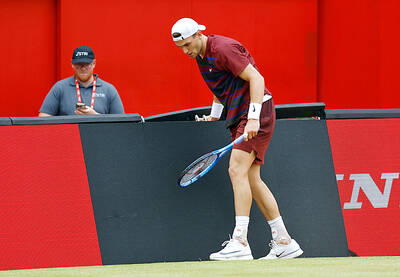
While British star Jack Draper spent the past week trying to find rhythm and comfort in his first grass tournament of the season at the Queen’s Club Championships in London, Jiri Lehecka on Saturday bulldozed everything in his path. After more than two furious hours of battle, their form was reflected in the final scoreline as Lehecka toppled a frustrated Draper, the second seed, 6-4, 4-6, 7-5 to reach the biggest final of his career, against Carlos Alcaraz. Lehecka is also the first Czech to reach the men’s title match at Queen’s since Ivan Lendl lifted the trophy in 1990. Draper, who
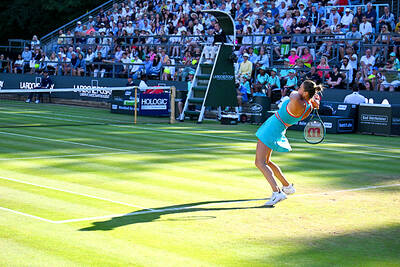
Top-ranked Aryna Sabalenka staged a “crazy comeback,” saving four match points before beating Elena Rybakina 7-6 (6), 3-6, 7-6 (6) in the quarter-finals of the Berlin Open on Friday. Sabalenka was 6-2 down in the final-set tie-breaker, but won six straight points to reach her eighth semi-final of the season. “Elena is a great player and we’ve had a lot of tough battles,” Sabalenka said. “I have no idea how I was able to win those last points. I think I just got lucky.” “I remember a long time ago when I was just starting, I won a lot of matches being down
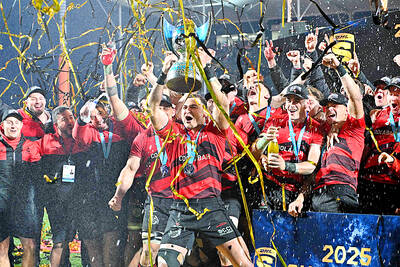
The Canterbury Crusaders edged the Waikato Chiefs 16-12 in an intense Super Rugby Pacific final battle in Christchurch yesterday to claim their 15th title in 30 years of the Southern Hemisphere competition. Hooker Codie Taylor scored a try and Rivez Reihana contributed 11 points from the kicking tee as the most dominant team in Super Rugby history extended their perfect home playoff record to 32 successive matches since 1998. The Chiefs, who were looking for a first title since 2013, scored first-half tries through George Dyer and Shaun Stevenson, but were unable to register a point after the break and fell to